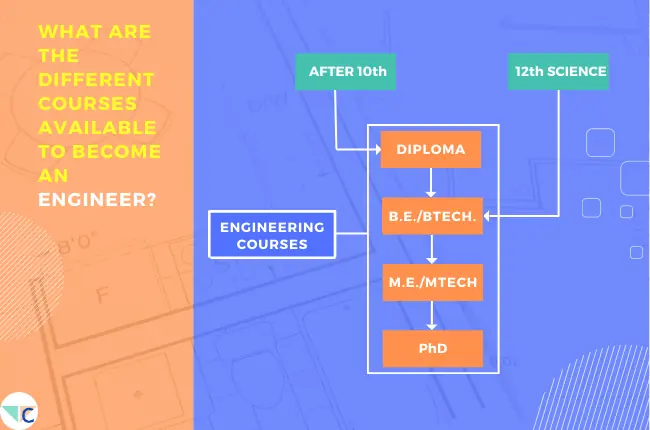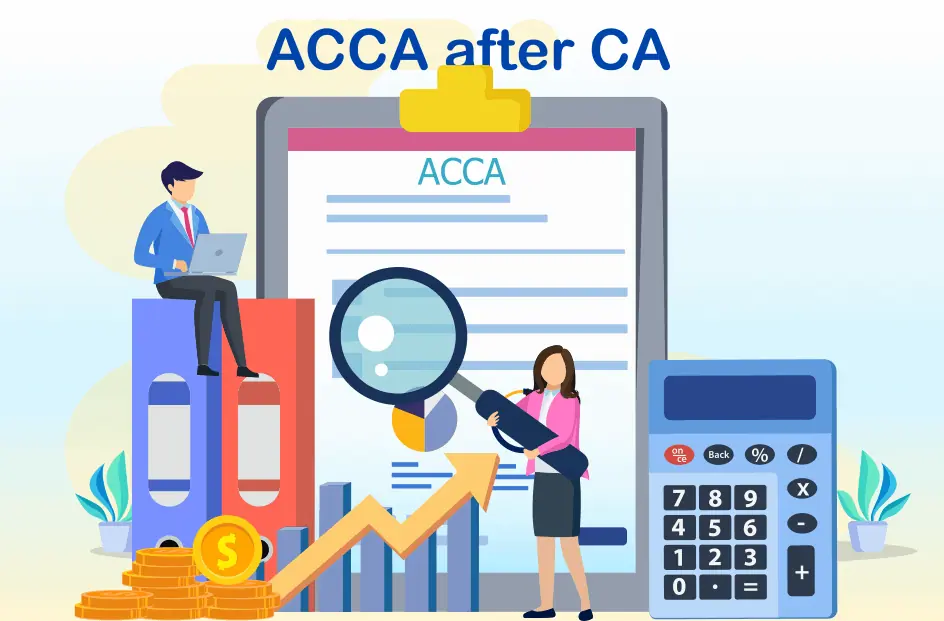Are you a student having a dream to become an engineer? Then this post will help and guide you to pursue your dream career in engineering. We have covered everything you need to know about top engineering branches, top colleges, eligibility and engineering courses.
The engineering profession is the most desirable career that many of us dream about, especially after passing 12th in the science stream. If we look at the government figure, 37.27 lakh students enrolled in engineering and technology courses.
Let’s get started.
What is Engineering?
Engineering is the branch of study that deals with science and technology. It includes innovation, design, and invention which solves our problems and makes our lives easier.
Engineering is one of the most desirable careers after 12th science.
There is always a wide scope and career prospects in the engineering field because it requires highly competitive engineers to fulfill the demand for research and development. Nations and humanity always seek technology either to solve their issues or to simplify the process.
Engineers work in different engineering fields such as electrical engineer, software developer, mechanical engineer, civil engineer, etc.; the field is differentiated by studying relevant engineering branches.
Engineering courses
There are four different paths to pursue engineering courses in India:-
Diploma in Engineering
You can pursue a diploma in engineering after passing 10th in any branch of your choice. It’s a 3-year course, after which you can either work or you can go ahead with an engineering degree.
Diploma holders can directly get admission in the 2nd year of an engineering degree, which is known as Lateral Entry.
Bachelor in Engineering / Bachelor of Technology
It’s a 4-year degree course and you are eligible to apply after passing 12th in PCM (physics, chemistry, mathematics) as your major subject. Diploma holders can get lateral entry directly in the 2nd year of engineering courses and can choose their favourite engineering branch.
Bachelor of Engineering (BE) and Bachelor of Technology (B.Tech.) are two different undergraduate degrees provided by Indian Universities. Course duration is of 4 years, whereas an integrated engineering degree is of 5 years. The integrated degree can be B.Tech. + M.Tech. or B.Tech. + M.Tech.
Post-graduation in Engineering
It’s a 2 year course and you are eligible after graduating as an engineer. Master of Engineering (ME) and Master of Technology (M.Tech.) are two different postgraduate degrees.
PhD in Engineering
Doctor of Philosophy (PhD) in engineering is a 3 to 6 years of course. It’s a research degree and the highest level of academic course for an individual in any field.
Below is a flowchart to understand the different courses available in engineering.

Engineering degrees have different branches, which we will discover later in our post.
What is the difference between B.E. and B.Tech.?
There is not much of a difference between BE and B.Tech. The curriculum is quite similar, the only differences you will find are in the fundamentals of some particular subject.
It’s not what you might have heard or read somewhere that B.E. is more theoretical and B.Tech. is more practical. In fact, there is an article available in Indian Express that covers the difference between B.E. and B.Tech. and it’s backed by the Dean of IIT Madras and the AICTE Chairperson.
Universities that have various other degrees such as science (B.Sc.), Arts (BA), and Commerce (B.Com.) offer Bachelor of Engineering (B.E.). Some examples are SPPU Pune, VNIT-Nagpur and Anna University Chennai.
B.Tech. is offered by Institutes and Autonomous Universities which offer courses mostly in technologies and technical fields such as IITs, NITs, and VIT.
The difference stated above is not always true and there might be some exceptions such as BITS Pilani offers B.E. and BIT Mesra offers B.Tech. and B.E. both for some engineering streams. AICTE (All India Council for Technical Education) approves both B.E. and B.Tech. as Engineering degrees.
So don’t get confused, rather than focusing on which one is better among the two, we will suggest you prioritize graduating from top institutes (B.E. or B.Tech. whichever the institute offers).
Above mentioned difference applies to M.E. and M.Tech. as well.
Eligibility Criteria for engineering courses
Diploma in Engineering(polytechnic)
Students must pass 10th standard with mathematics and science as their major subjects.
Bachelor’s degree (B.E./B.Tech.)
- Students must pass 12th standard with physics, chemistry and mathematics as their major subjects.
- He/she should have completed a 3-year diploma in engineering or polytechnic from a recognised University or institute to get a lateral entry in B.E./B.Tech. 2nd Year.
List of different Engineering Branches
- Aeronautical Engineering
- Aerospace Engineering
- Agricultural Engineering
- Automobile Engineering
- Biomedical Engineering and bioengineering
- Biotechnology
- Biotechnology Engineering
- Chemical Engineering
- Civil Engineering
- Computer Science Engineering
- Electrical Engineering
- Electronics & Communication Engineering
- Electronics & Instrumentation Engineering
- Industrial and Production Engineering
- Information Technology
- Instrumentation and Control Engineering
- Mechanical Engineering
- Metallurgical Engineering
- Mining Engineering
- Ocean and Marine Engineering
- Petroleum Engineering
- Production Engineering
- Robotics Engineering
- Sustainable Energy Engineering
- Textile Engineering
Top Engineering Branches
The list of engineering branches is huge, hence the question persists, Which Engineering branch is best?
Let’s find out.
For your information, we have listed top engineering branches as per the job opportunity and pay scale:-
| Engineering Branch | Scope | Average Salary |
|---|---|---|
| Computer Science/IT | High demand, best salary package, probably the best in the industry. Ample international opportunities. | 4 -20 lakh per annum |
| Electrical Engineering | High demand and a future-proof branch. These days automobile industries are recruiting electrical engineers in large numbers. | 3- 15 lakh per annum |
| Mechanical Engineering | Despite electrification, you can’t move any machine without a mechanical engineer. | 2 – 12 lakh per annum |
| Civil Engineering | High-demand, Civil Engineer is required for the construction and maintenance of infrastructure. | 3 – 15 lakh per annum |
| Electronics and Communication | Companies are much less in number compared to other engineering branches in India. It offers good pay and opportunities to work in the electrical as well as software industries, it has a fair scope overseas. | 3 – 15 lakh per annum |
| Chemical Engineering | Chemical engineers always have a job opportunities in fertilizer manufacturing, food processing, oil and gas industries. | 3 – 15 lakh per annum |
Now, we are listing the Top five engineering branches students enrol the most.
- Computer Engineering with 9.3 lakh students,
- Mechanical Engineering with 6.8 lakh students,
- Electronics Engineering with 6.1 lakh students,
- Civil Engineering with 4.8 lakh students and
- Electrical Engineering with 3.7 lakh students enrolled.
Honestly, we don’t consider any engineering branch as best and worst. If you have an interest in a specific engineering specialization, then definitely you will gain knowledge, take challenges and thereafter you can achieve a successful engineering career. Every engineering branch has scope and opportunities, it’s the number of openings and salary structure that varies.
We recommend you pursue your career in a specific branch of engineering that fascinates you. Don’t select the engineering branch according to the salary packages mentioned above. Many students make a blunder in the initial stage and regret it in the later phase of their lives.
According to the reports, most of the students change their engineering branch in the 2nd year of the engineering course and sometimes opt for different career fields after engineering courses such as MBA, Banking and Law.
This mainly happens because they could not continue with the engineering branch they opted for. They were not aware of the challenges and concepts in their field. Therefore one should choose their engineering career wisely.
Career and scope after Engineering
Engineering career offers ample employment opportunities in India and overseas.

After completion of a 4-year degree course, you will become an engineer, and the opportunities you will get are:-
- You can start working in an organisation as a graduate engineer trainee with an average initial salary between 3-7 lacs per annum. If you pursue your degree from a top-tier college, it may go above 10 lakh per annum.
- There is always a good scope for an engineer to work abroad.
- Pursue post-graduation courses in engineering and technology (M.E./M.Tech.) or Management (MBA). You can apply for government jobs through GATE, IES and SSC JE.
- There is another opportunity for a Lectureship in colleges after clearing CSIR NET/SET.
- If you are interested in research, then a PhD can be a good option. There are many fellowship programs available, one such scheme is the PMRF (Prime Minister Research Fellows) scheme to support you while studying. You will get a stipend of Rs 70000 per month in a scheme.
Sounds interesting, what do you say?
Let’s move on to different ways to get admission to engineering.
Engineering Admission process
There are multiple engineering entrance exams in India conducted by Central and state governments for the enrollment of students in different colleges across India. Private colleges conduct separate entrance exams for the students.
You can get admission to different colleges through merit lists as well.
Popular entrance exams conducted by central and state governments for engineering courses are:-
- Central Government Exams
| JEE Main | National Test Agency (NTA) for admission to undergraduate conducts joint Entrance Examination (JEE Main) Engineering Programs (B.E./B.Tech.) at NITs, IIITs, other Centrally Funded Technical Institutions (CFTIs) and state government Institutes. It’s an eligibility test for JEE (Advanced), which is conducted for admission to IITs. |
| JEE Advanced | Joint Entrance Examination – Advanced is conducted by IITs for admission to various undergraduate programs offered in different IIT’s. Other central government institutes such as IISC, IISER, IIST, RGIPT and IIPE consider JEE Advance rank. |
- State Government Exams
| MHT CET | Maharashtra Common Entrance Test is conducted for admission in undergraduate programs (B.E./B.Tech.) in different colleges of Maharashtra. Students from outside Maharashtra can also apply. |
| UPCET | AKTU Lucknow conducts the Uttar Pradesh Combined Entrance Test. They have reserved most of the seats for UP students, but students from other states can also apply for 10% of seats. Although most of the colleges prefer JEE main. |
| KEAM | Kerala Engineering Architecture Medical entrance exam conducted by the government of Kerala for admission in undergraduate programs (B.E./B.Tech) offered by various colleges in Kerala. Students from outside Kerala can apply. |
| WBJEE | West Bengal Joint Entrance Exam conducted by the government of West Bengal for admission in undergraduate programs (B.E./B.Tech) in various colleges of West Bengal. (Eligibility criteria focus on students of West Bengal). |
| UG-CET | Karnataka Common Entrance Test conducted by Karnataka Examination Authority, for admission in undergraduate programs in various engineering colleges of Karnataka. (Eligibility criteria focus on students of Karnataka). |
| TNEA | Tamil Nadu Engineering Admission process conducted by Anna University. It’s an admission process for the undergraduate program (B.E./B.Tech.) in government colleges of Tamil Nadu (Eligibility criteria focus on students of Tamil Nadu). |
| AP EAPCET | Engineering Agricultural and Pharmacy Common Entrance Test conducted by JNTUK Kakinada for admission in undergraduate programs in different government colleges of Andhra Pradesh (Eligibility criteria require students from Andhra Pradesh and Telangana). |
| TS EAMCET | Engineering Agricultural and Medical Common Entrance Test conducted by JNTU Hyderabad for admission in undergraduate programs in different government colleges of Andhra Pradesh (Eligibility criteria require students from Andhra Pradesh and Telangana). |
There are other state government exams, but most of the reputed institutes prefer JEE Main.
Popular Engineering exams are conducted by private or autonomous institutes.
| BITSAT | Birla Institute of Technology and Science Admission Test (BITSAT) 2022 is an entrance exam conducted by Birla Institute of Technology and Science (BITS), Pilani for admission to Undergraduate programs (B.E.). |
| AEEE | Amrita Engineering Entrance Examination conducted by Amrita Vishwa Vidyapeetham University for admission in undergraduate programs (B.Tech.). |
| VITEEE | Vellore Institute of Technology conducts the VIT Engineering entrance exam for admission to undergraduate programs (B.Tech). |
| COMEDK UGET | Consortium of Medical, Engineering and Dental College of Karnataka (COMEDK) conducts an undergraduate Entrance test (UGET) for admission in various undergraduate programs in Engineering, medical and dental. |
| SAAT | Siksha O Anusandhan University conducts SAAT for admission in various undergraduate programs offered by the University. |
| UGEE | IIIT Hyderabad conducts the Undergraduate Entrance Exam for dual degree programs. For a single degree, they have SPEC and JEE mains. |
| MET | Manipal Entrance Test conducted by Manipal Academy of Higher Education (MAHE) for admission in Undergraduate (B.Tech) offered by Manipal Institute of Technology (MIT). |
| KIITEE | The Kalinga Institute of Industrial Technology (KIIT) conducts the Kalinga Institute of Industrial Technology Entrance Exam (KIITEE) for admission in undergraduate (B.Tech.) and master’s programs (M.Tech.) in KIIT. |
| SRMJEE / SRMAPET | SRM University conducts exams for admission in undergraduate programs (B.Tech.) in all SRM groups of institutes. |
| PUEE | Pearson Undergraduate Entrance Exam for Engineering conducted by Pearson VUE. It offers admission to various universities like Amity University, Amrita Vishwa Vidyapeetham, Adamas University and many more. |
Popular engineering exams for diploma holders to get lateral entry in respective engineering branches:-
| LEET-TU | Thapar University conducts Lateral Entry Engineering Test for admission in the 2nd Year of B.E. |
| CUCET LEET | Chandigarh University conducts Lateral Entry Engineering Test for admission in the 2nd Year of B.E. |
Different states conduct their entrance exams for lateral entry. Private institutes either conduct exams or accept students on a merit basis.
State-level entrance exams are JELET (West Bengal), AP ECET (Andhra Pradesh), TS ECET (Telangana), UKSEE(Uttarakhand), OJEE (Odisha), DTU LEET (Delhi), DCET (Karnataka) etc.
These state-level exams ask students to show a nativity certificate of the same state wherein the exams are conducted.
To get nativity certificates or domicile certificates, various government boards have created different criteria. Please visit the official websites to check such criteria and see whether you fulfil the requirements.
Popular engineering exams for post-graduation (M.E./M.Tech.) in respective engineering branches.
| GATE | Graduate Aptitude Test in Engineering (GATE) is conducted by seven IITs and IISc for admission in M.E./M.Tech programs in IITs. It offers jobs in PSUs. |
| BITS HD | Birla Institute of Technology and Science Pilani conducts Higher Degree (HD) exams for admission in their master’s (M.E.) programs. |
| VITMEE | Vellore Institute of Technology (VIT) University conducts a master entry exam (VITMEE) for admission in their master’s (M.Tech.) programs. |
| GAT PG | The GAT exam is conducted by the Gandhi Institute of Technology and Management for masters (M.Tech.). |
| MET | Manipal Entrance Test conducted by Manipal Academy of Higher Education (MAHE) for admission in masters programs (M.Tech) offered by Manipal Institute of Technology (MIT) and Manipal School of Information Sciences (MSIS). |
| SRMJEEE PG | SRM University conducts exams for admission in undergraduate programs (M.Tech.) in all SRM groups of institutes. |
GATE is a prominent exam for the master’s program (M.E./M.Tech). There are other state-level exams, but again please check their eligibility criteria, as it needs a nativity certificate.
State-level entrance exams are PGET (West Bengal), AP PGECET(Andhra Pradesh), TS PGECET (Telangana), TANCET (Tamil Nadu), OJEE (Odisha), DTU (Delhi), PGCET (Karnataka) etc.
Popular engineering exams for PhD in Engineering and Technology
| CSIR NET | Council of Scientific and Industrial Research National eligibility test is conducted by NTA. It gives opportunities to Junior Research Fellowship (JRF) and Lectureship/Assistant Professor in Indian universities and colleges. Hereafter you can pursue a Ph.D. from CSIR. |
| GATE | Graduate Aptitude Test in Engineering (GATE) gives opportunities in IITs and IISc. M.Tech. students can directly apply, B.Tech. students need to clear exams or have a certain level of experience. Please check the institute website for detailed eligibility criteria and admission procedures. |
Always check University and institute websites for advertisements on admission to PhD programmes. Most of the Institutes offer admission based on interviews.
If you are interested in the research of various science and mathematics subjects other than engineering, then there are TIFR, ICMR JRF, and UGC NET.
- Top Engineering exams are mentioned above but you can explore more as different states conduct their state-level entrance examination for admission to engineering courses.
- Many private colleges conduct their entrance exams for admission to various engineering branches.
- IITs and NITs don’t have any lateral entry program, but state colleges have a good opportunity for diploma holders.
- Few Private colleges provide direct admission based on marks in diploma.
We always recommend you check the Universities and Institute websites for a better understanding of the admission process, exams, eligibility and important dates. You will get the latest and updated information.
Top Engineering Colleges in India
Top 10 Engineering Colleges in India as per National Institutional Ranking Framework (NIRF).
| College | Rank |
|---|---|
| Indian Institute of Technology Madras | 1 |
| Indian Institute of Technology Delhi | 2 |
| Indian Institute of Technology Bombay | 3 |
| Indian Institute of Technology Kanpur | 4 |
| Indian Institute of Technology Kharagpur | 5 |
| Indian Institute of Technology Roorkee | 6 |
| Indian Institute of Technology Guwahati | 7 |
| Indian Institute of Technology Hyderabad | 8 |
| National Institute of Technology Tiruchirappalli | 9 |
| National Institute of Technology Karnataka | 10 |
Top 5 institutes or universities in India other than IITs and NITs
| Institute/University | Rank |
|---|---|
| Vellore Institute of Technology | 12 |
| Institute of Chemical Technology | 15 |
| Amrita Vishwa Vidyapeetham | 16 |
| Jadavpur University | 17 |
| Anna University | 18 |
Conclusion
An engineering career is a very lucrative and most desired profession today. Because of the competitive nature of the field, unemployment rates are also high.
Therefore, we would recommend two things,
First, choose the engineering branch that interests you as it will hold your passion for the subject and you will never get bored.
Second, always try to get admission to a reputed and good college, definitely by securing a good rank in the entrance exam. To get quality education, knowledge and of course placements, you need a reputed institute.
I hope the blog post on engineering helped and answered all your doubts. If it did, then please share it with your friends and family.
For science students, we recommend you check other blogs




